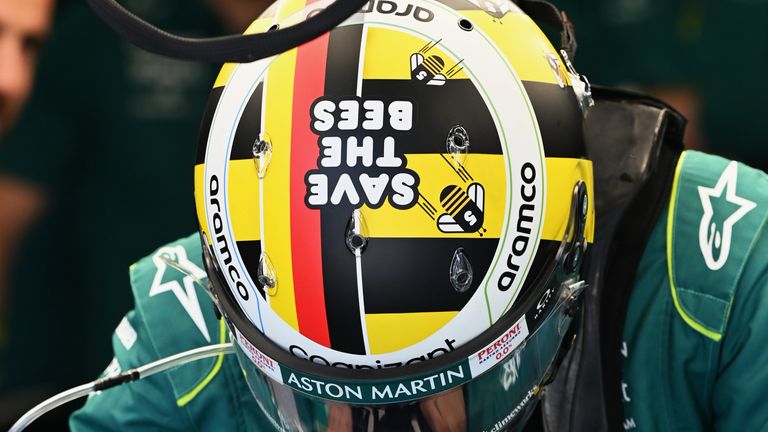Alcohol, algae, waste: What fuels could Formula 1 cars use in the race against global warming?
F1's 2026 regulations will see the introduction of sustainable fuels, with alcohol and algae possible ingredients to the future of Grand Prix races; it's the rule change that has seen Audi join Mercedes, Red Bull Ford, Ferrari and Renault as engine suppliers
Sunday 23 April 2023 07:05, UK
Global warming is becoming an ever-pressing issue, and it sometimes feels like a guilty pleasure to watch Formula 1. But, actually, this is the sport that is moving the world to a more sustainable place - here's how.
As part of its commitment to being carbon neutral by 2030, F1's rule-makers have made 2026 the year that the rule changes to the engines and fuels will lead the way for sustainable fuels to power the sport.
These regulations are clearly a hit in the car industry - Audi and Ford have joined the F1 party while other manufacturers are looking for a way in.
- How F1's spring break could impact the world championship
- Why is Hamilton troubled by Mercedes' seat position?
- F1: Meet the drivers
- Get Sky Sports | Download the Sky Sports App | Listen to the Sky Sports F1 Podcast
But what is actually happening? Sky Sports F1 takes a look, with Formula 1's chief technical officer Pat Symonds...
What is happening in 2026?
The rule changes in 2026 are aimed at making Formula 1 even more sustainable, driving forward innovation to make the car industry as a whole better for the world in the race against global warming.
The regulations will look to ensure the following:
- No new carbon from fossil fuels will be released into the atmosphere
- There will be three times the electric power - the aim is for the MGU-K to produce around 350kW in 2026 (the electrical component of the power unit currently produces 120kW of energy)
- More than 1,000 horsepower engines with less fuel used - in 2026, F1 is aiming for each car to use just 70kg of fuel during a Grand Prix, compared with 100kg in 2020
- Cheaper engines - There will be an engine-specific cost cap to encourage more car manufacturers to get involved in finding innovative solutions
Symonds explains that the fuels used will be a mixture of alcohol and a more complex fuel, made by the manufacturer.
"Putting something in [the fuel mixture] like ethanol is actually quite good because it's cheap," said Symonds, speaking during 2023 pre-season testing.
"We anticipate that 20 per cent of the fuel is going to be one of these oxygen-type fuels like ethanol and the rest is going to be the more complex molecules that give you the very high energy."
"The important thing is that it is a 'drop-in' fuel, so we can show the world that you can actually synthesis this fuel, you can put it in your car and drive off."
Could algae power F1 cars of the future?
A 'drop-in' fuel is a sustainable fuel that is similar enough to conventional fuel that it can be mixed in and still be used in an engine.
It's a little bit like adding water to squash - while you may not get quite as much sugar as a glass full without water, you still get a tasty drink which doesn't use up the bottle of the sugary bit quite as much.
Symonds explained that for the teams, "the real trick is where you get your carbon from. You can get that from algae, from air carbon-capture, from waste".
Fuels are made of hydrocarbon, which as the name suggests, is made up of hydrogen and carbon atoms.
"The quality of the fuel that you make depends on how you mix up your hydrogen and your carbon atoms," explains Symonds.
"You start building up these long carbon chains into good fuels, the gasolines, the things like that.
"The great thing with things like gasoline, when you get eight carbon atoms and even above that is that you get an awful lot of energy in them."
One kilogram of gasoline has 43 megajoules of energy in it - that's the equivalent energy to about 2.6 million glasses of orange squash.
"When you go to your ethanol and smaller hydrocarbons, they don't have that amount of energy, so you're going to have more volume of fuel going into your engine," says Symonds.
These shorter hydrocarbons are easier to get your hands on, and like water with squash, top up the rest of the engine while the car industry tries to make enough sustainable fuels for cars across the world to eventually use purely sustainable fuels.
How will it work in F1?
Rather than the amount of fuel being limited, F1 will instead limit teams on the amount of energy in the engine during a race.
This means that teams will gain performance on the track by making their fuels more efficient, so that they can use less of it - the lighter the car, the faster it goes.
"We're saying 33,000 MJ of energy an hour, that's what you can flow into the engine," explained Symonds.
"If you have a fuel that requires 70 kilograms of that particular fuel per hour, and another fuel, 72 kilograms per hour - it doesn't matter, the fact is that everyone has got the same energy.
"It's how you use that energy that matters."
Why will this help the environment?
F1 will be encouraging the manufacturers and Mercedes, Ferrari, Ford, Renault and Audi will all be incentivised to find the best way of fuelling cars with sustainable fuel.
Quite often, the technology involved in F1 makes its way to road cars after a few years - effectively Formula 1 is one of the most famous and glamourous test benches in the world.
The kinetic energy recovery system (KERS) was a system which stored up an electrical boost for the engine by recycling the heat energy created from braking at corners.
This technology came into F1 in 2009 and now many modern cars use this system to help use fewer fossil fuels.
The aim is that the use of sustainable fuels in one of the most exciting sports in the world will help lead the way as the motor industry moves away from fossil fuels and towards a cleaner future.
The Formula 1 season resumes with the Azerbaijan Grand Prix from April 28-30, with the first Sprint weekend of 2023 shown in full live on Sky Sports F1. Watch Saturday's Sprint at 2:30pm and Sunday's race at 12pm. Get Sky Sports











